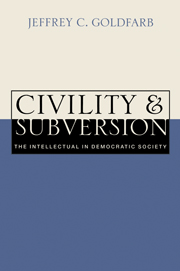My research experience in Central Europe, from a marginal cultural movement, Polish Student Theater of the post-war era, to a marginal but articulate political movement, the Polish democratic movement of the seventies, to a broad and profound societal movement, Solidarnosc of 1980 and 1981, to an underground oppositional cultural movement, Underground Solidarity of the eighties, to the major transformations of 1989 world-wide, testifies to the potential power of the intellectual in democratic society. It points to the importance of the ideal of civility and the intellectual's relationship to it. This experience suggests that when we reflect on the significance of the intellectual in democratic society, we should keep in mind that the consequences of intellectual actions may seem relatively isolated with fleeting duration, but can become wide ranging with long-term consequences.
My experience further suggests that the intellectual may be not only a public scholar or scientist, or a scholarly or scientific political actor, but also an artist with public concerns. The Central European intellectuals, who acted as if they lived in a free society, constituting freedom and revitalizing the idea of civil society, often were artists, poets, painters, musicians, the makers of film and theater. Their experiences, and the relationship between these and the experiences of others, provide us with an opportunity to consider more closely the changing role of artists as intellectuals in the making and substantiation of democratic society, and to consider the connection between the artists' struggle for cultural independence and the task of constituting the institutional supports of civility.
